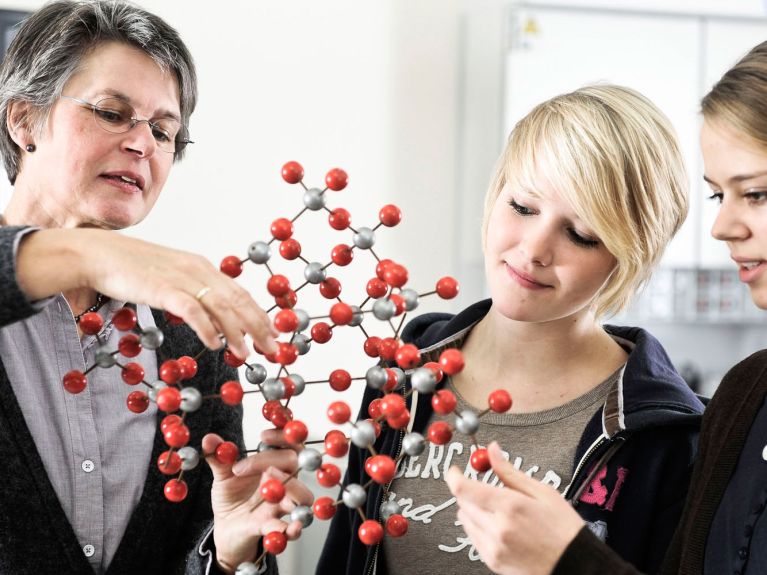Research
These websites show how exciting, many-facetted and well-organized research is in Germany. Explore institutions, locations and focuses.

Deutscher Zukunftspreis (German Future Prize)
The curtain goes up on the “inventors” of MP3 and the minds who enabled spoken dialogue with the computer: since 1997, the Federal President rewards outstanding technical, engineering and natural science achievements with the German Future Prize (Deutscher Zukunftspreis).
www.deutscher-zukunftspreis.de
German Research Network
The Gigabit Scientific Network (G-WiN), which is operated by the Organization for the Promotion of the German Research Network (DFN-Verein), is currently being used in approximately 300 scientific and research facilities for ultra high-speed data transmission. G-WiN was conceived within the context of the global “Internet2”, which is currently under construction all over the world in the scientific networks.
German Research Portal
The Research Portal points the way toward teaching and research in Germany. Which research centers belong to the Helmholtz-Gemeinschaft? Where can I find institutes belonging to the Max-Planck-Gesellschaft? Interactive research maps show you all the locations at one glance, and you can click your way to the university or scientific organization you are interested in.
German Reference Centre for Ethics in the Life Sciences
Information on a giga-scale: since 1999 the German Reference Centre for Ethics in the Life Sciences (Deutsches Referenzzentrum für Ethik in den Biowissenschaften) has been developing a central collection of information which provides a broad basis of knowledge for ethical decisions. It compiles all relevant sources from the fields of life sciences, medicine, law, sociology and the natural sciences.
German Aerospace Center
The German Aerospace Center (Deutsches Zentrum für Luft- und Raumfahrt e.V., DLR) explores vast distances. But the question of how to come down to earth again is also a concern of the organization, which is a research center and national space agency in one.
Forum for Sustainability (FONA)
Renewable resources should only be used to the extent that they are able to regrow. If you observe this formula, you are striving for sustainability. Politicians, researchers and experts meet every year at the Federal Ministry of Education and Research’s Forum for Sustainability (FONA) in order to explore new thematic emphases for the survival of coming generations.
Fraunhofer Association
Developments such as the digital watermark, solar air-conditioners which cool with the sun, or gas chrome windows which produce a “chemical solar eclipse“ come from the Fraunhofer Society for the Advancement of Applied Research (Fraunhofer-Gesellschaft zur Förderung der angewandten Forschung e.V., FhG). It conducts contract research for industry, service providers and the public sector, and is Germany‘s leading sponsoring agency for institutions of applied research.
Geotechnologien – Forschung für die Zukunft (Geotechnologies – Research for the Future)
Research for the future: how can the Earth be used, and how can we, its inhabitants, be protected in the long run? “Geotechnologies” (Geotechnologien) is a research and development program sponsored by the German Ministry for Education and Research (Bundesministerium für Bildung und Forschung, BMBF) and the German Research Society (Deutsche Forschungsgemeinschaft, DFG).
Hessian Foundation for Peace and Conflict Research
Exploring peace means understanding the reasons for strife and conflict. Identifying a situation of conflict early can contribute to avoiding that conflict. This is the task that the Hessian Foundation for Peace and Conflict Research (HSFK) has dedicated itself to since it was founded in 1970.
innovations-report
What’s new from the fields of science, industry and business? The innovations-report (ir) will keep you up to date on new technologies, news from research and development, scientific events, funded projects, competitions and much more.
Jugend Forscht (Research by Young People)
Who developed a system to keep drivers from falling asleep at the wheel? Who studies the neuron interfaces between people and computers? The clever students of “Jugend forscht“ (Research by Young People: at last count more than 7000 participants! The competition has been held annually every since 1966. It is aimed at young people up to the age of 21 who are interested in the natural sciences, math and technology.
Young Researchers’ Network
For young researchers looking for someone to tunnel photons with, this platform is just the right place: former participants in the competition “Jugend forscht“ (Young People Do Research) have founded the association JuFORUM e.V. to create a contact pool and strengthen ties between science and industry.
kooperation-international.de
At www.kooperation-international.de you will find a helpful guide for international cooperative ventures in education and research. This communication forum for anyone searching for information or cooperation in Germany or abroad was initiated by the German Federal Ministry of Education and Research (BMBF – Bundesministerium für Bildung und Forschung).
www.kooperation-international.de
Leibniz Association
In science, Gottfried Wilhelm Leibniz eV (WGL), 89 research institutes and scientific service facilities have joined forces, to be financed under the model of the “Blue List“ jointly by federal and state governments. Their interests channeled the Leibniz Association.
Max Planck Society
Where is our place in the universe? How are stars born? What holds the world together inside? How does culture emerge? As a complement to academic research, the Max Planck Society for the Advancement of Science (Max-Planck-Gesellschaft zur Förderung der Wissenschaften e.V., MPG) conducts extra-university research in the natural and biological sciences and the humanities.
Research in Germany
The “Research in Germany” portal is the central information platform of the initiative to "Promote Innovation and Research in Germany" by the Federal Ministry of Education and Research (BMBF).
Union of the German Academies of Sciences and Humanities
Working together for research excellence: the Union of the German Academies of Sciences and Humanities, also known as the Academy Union, unites seven academies in science and the humanities between Bavaria and Hamburg. The long-established umbrella organization headquartered in Berlin promotes academic exchange and young talent in a wide variety of different disciplines.